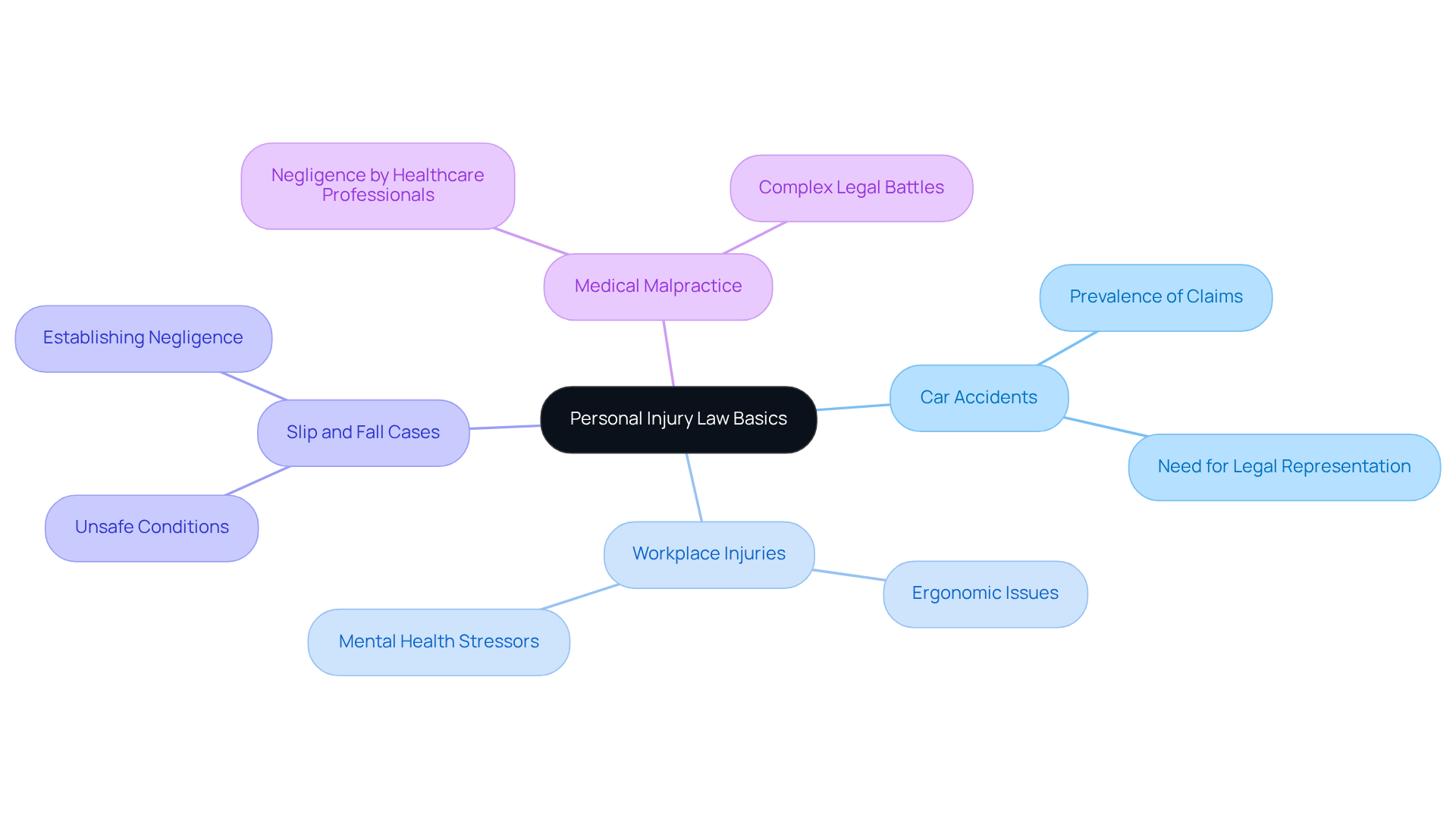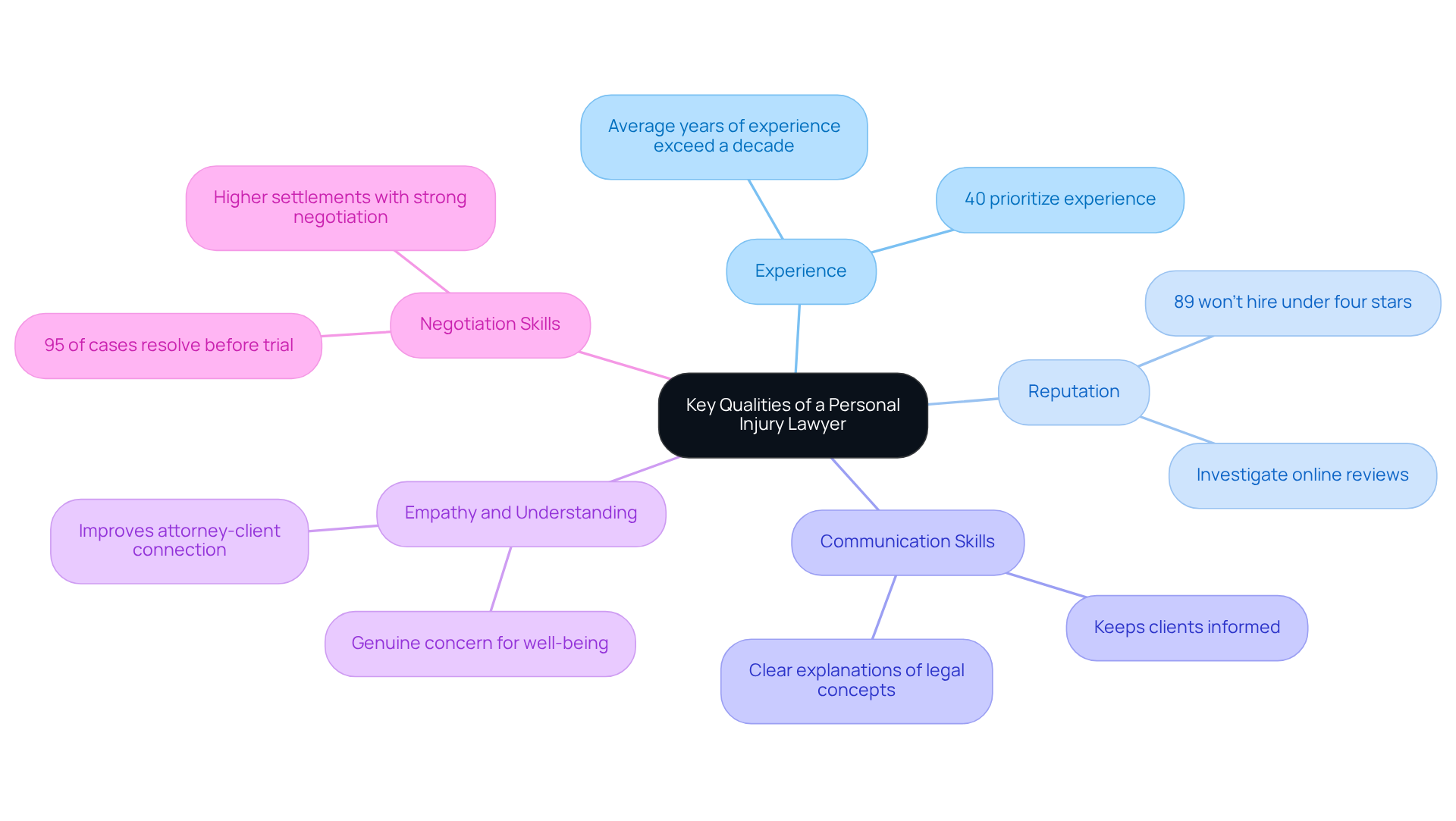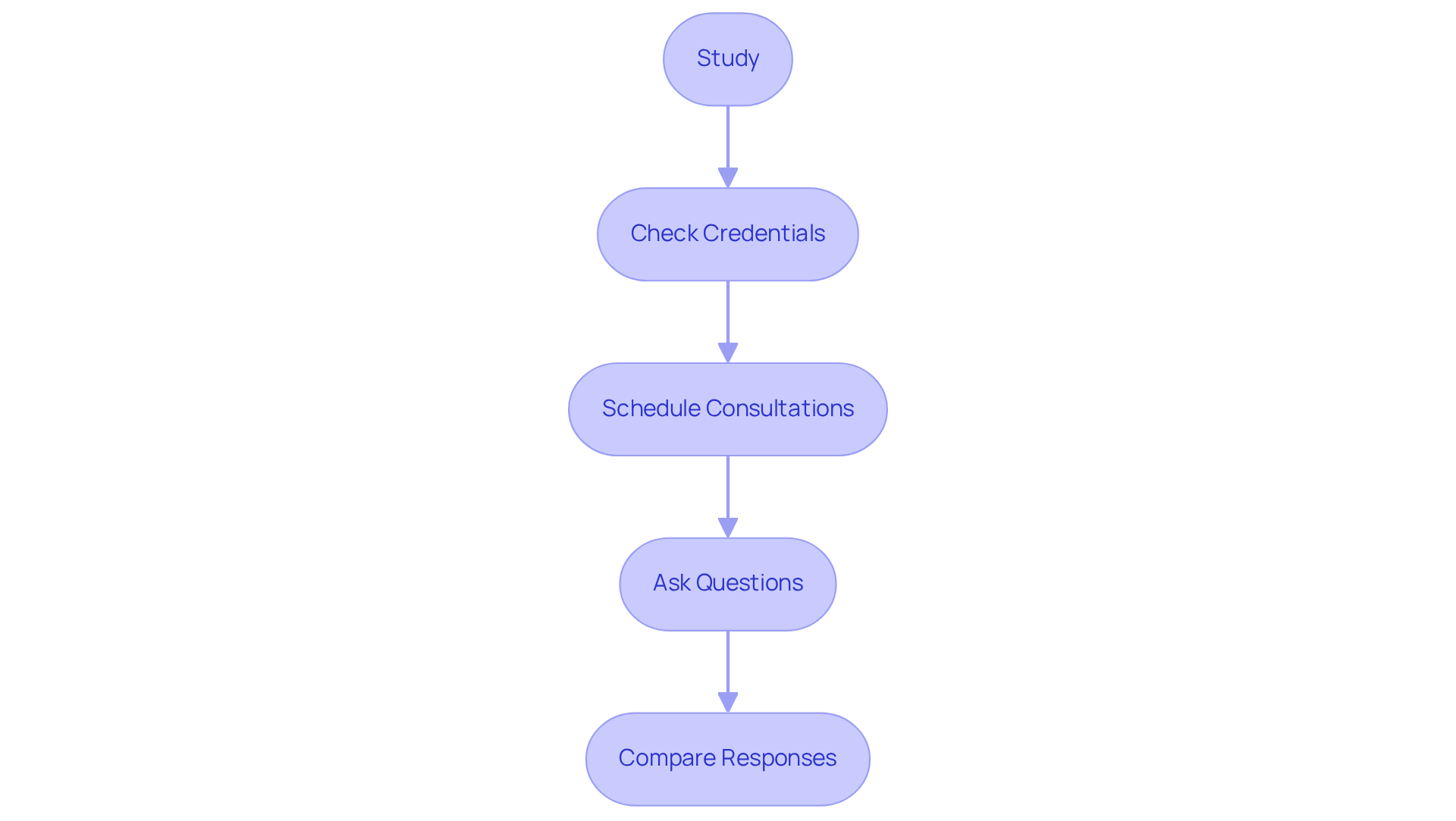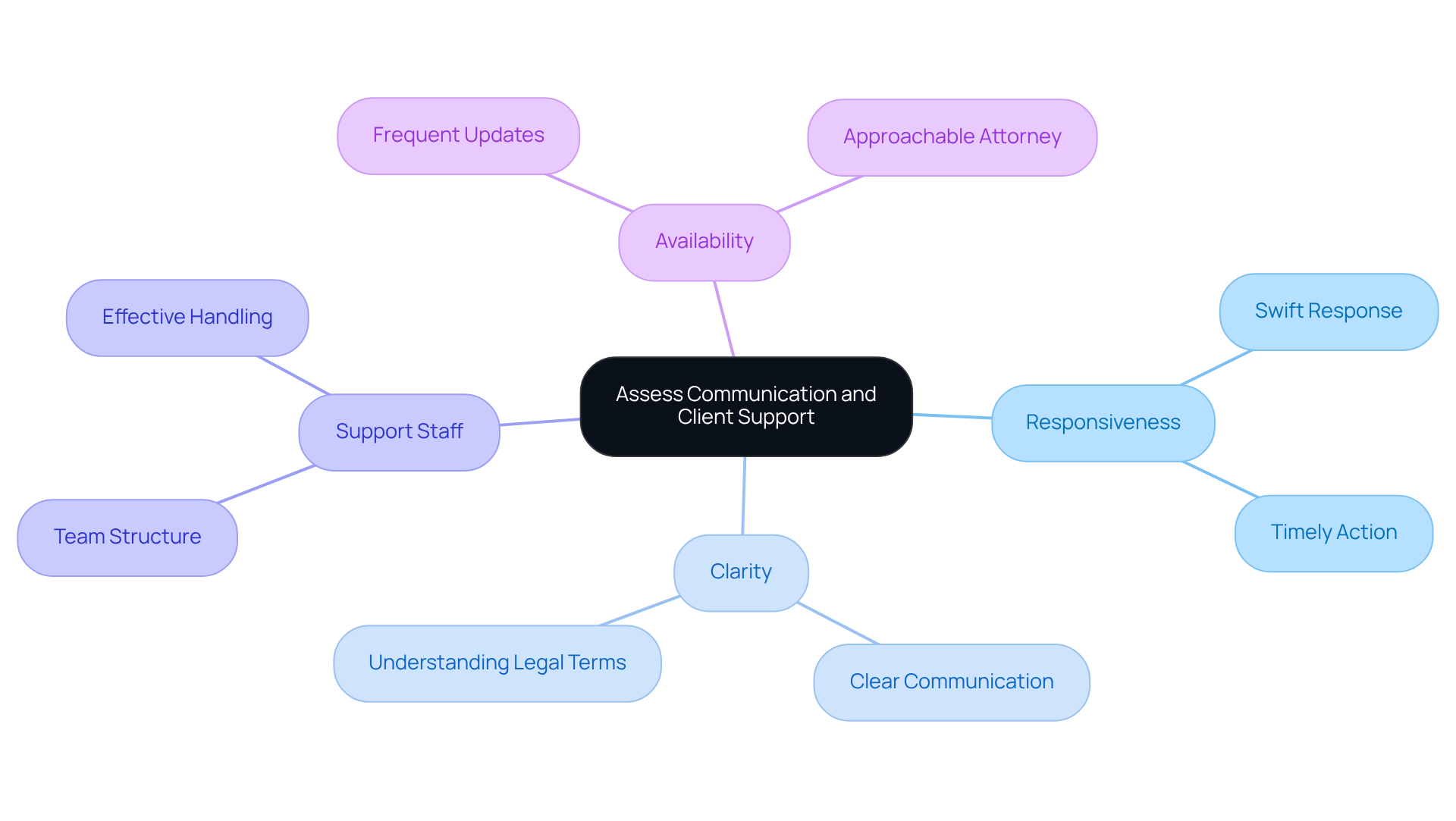Overview
Choosing the right personal injury lawyer for your case is crucial, especially when facing the challenges of confusing legal processes or unexpected accidents. Key qualities to evaluate include:
- Experience
- Reputation
- Communication skills
- Empathy
- Negotiation abilities
These factors are not just checkboxes; they are essential for achieving successful outcomes.
Imagine feeling overwhelmed by your situation, unsure of where to turn. A lawyer who embodies these qualities can provide the effective representation and support you need throughout the legal journey. Remember, you deserve someone who will fight for you and ensure your voice is heard.
We’re here to remind you: you’re not alone in this fight. Your rights matter, and with the right legal support, you can navigate this process with confidence. Let’s take the next step together.
Introduction
Navigating the aftermath of a personal injury can be overwhelming. It’s especially challenging when faced with the complexities of legal disputes stemming from negligence or intentional harm. Understanding the nuances of personal injury law is essential for victims seeking justice and compensation. This article delves into the critical factors that should guide individuals in selecting the right personal injury lawyer, emphasizing the qualities that can make or break a case. With so many options available, how can one ensure they choose an attorney who not only understands the law but also genuinely advocates for their best interests?
Understand Personal Injury Law Basics
Personal harm law addresses legal disputes that arise when an individual suffers damage due to another party's negligence or intentional actions. Understanding the common forms of personal harm disputes is crucial for assessing whether your situation warrants legal action and determining the type of attorney you may need. Here are key categories:
- Car Accidents: These cases involve injuries resulting from vehicle collisions, which rank among the most prevalent personal injury claims. Many victims receive compensation, highlighting the importance of having legal representation.
- Workplace Injuries: Incidents occurring in the workplace can lead to serious harm for employees. With the increase in remote work, claims related to ergonomic issues and mental health stressors are becoming more frequent, making legal expertise essential for navigating employer liability.
- Slip and Fall Cases: Injuries sustained due to unsafe conditions on someone else's property are categorized here. These situations often require thorough investigations to establish negligence and liability.
- Medical Malpractice: Harm caused by a healthcare professional's negligence can lead to complex legal battles. Victims may seek compensation for injuries resulting from misdiagnosis, surgical errors, or inadequate patient care.
Legal experts emphasize that understanding these categories is vital for victims to effectively advocate for their rights. Successful claims often hinge on the ability to demonstrate negligence and the extent of damages suffered. As tort law evolves—especially with the integration of technology and changing economic factors—having a knowledgeable lawyer is essential for securing just compensation. Remember, you don’t have to face this alone; we’re here to fight for you.

Identify Key Qualities of a Personal Injury Lawyer
When searching for a personal injury lawyer, several key qualities should guide your decision-making process:
- Experience: Prioritize a lawyer with a proven track record in handling personal injury cases similar to yours. In 2025, nearly 40% of clients cited experience and a strong track record as their top priority when choosing a law firm. The average years of experience for leading personal injury lawyers often exceed a decade, which can significantly influence case outcomes.
- Reputation: Investigate online reviews and testimonials to assess the attorney's standing in the community. A strong reputation can be indicative of an attorney's ability to secure favorable settlements and verdicts. Notably, 89% of consumers would not consider hiring a law firm with fewer than four-star ratings.
- Communication Skills: Effective communication is crucial. A skilled attorney should clearly explain legal concepts and keep you informed throughout the process, addressing any concerns you may have.
- Empathy and Understanding: Select a lawyer who demonstrates genuine concern for your well-being. Comprehending the emotional impact of individual harm matters can improve the attorney-client connection and result in more effective representation.
- Negotiation Skills: As nearly 95% of harm situations resolve prior to trial, effective negotiation abilities are crucial for obtaining just compensation. Lawyers with a solid reputation for negotiation often secure higher settlements for their clients.
By concentrating on these attributes, you can improve your prospects of locating a legal representative who will adeptly support your rights and manage the intricacies of your situation.

Evaluate Potential Lawyers: Steps to Take
To effectively evaluate potential personal injury lawyers, consider these essential steps:
-
Study: Begin by compiling a list of local attorneys who specialize in accidents. Utilize online directories, bar association websites, and personal referrals to identify qualified candidates. Look for firms like Vasquez Law Firm, which focuses on representing victims of car accidents and workplace incidents, with several offices conveniently located in North Carolina and Florida.
-
Check Credentials: Verify each attorney's qualifications, including their education, licensing status, and any disciplinary actions. This ensures you are considering reputable professionals who can provide the comprehensive legal support you need.
-
Schedule Consultations: Most personal injury lawyers, including those at Vasquez Law Firm, offer free initial consultations. This is a valuable opportunity to discuss your situation and assess their approach. Research shows that effective consultations can significantly impact outcomes. In fact, around 95% of individual harm matters are settled through agreements before going to trial, highlighting the importance of these discussions.
-
Ask Questions: Prepare a list of pertinent questions to ask during your consultations, such as:
- What is your experience with cases similar to mine?
- How do you structure your fees, and what should I expect in terms of costs? The average contingency fee for personal injury lawyers is approximately 33% of the total amount recovered, making it essential to understand this. At Vasquez Law Firm, you pay nothing unless they succeed in your matter, ensuring financial limitations do not prevent you from pursuing justice. Additionally, inquire about flexible payment plans for other practice areas.
- What strategies do you suggest for my situation?
-
Compare Responses: After your consultations, evaluate the attorneys based on their responses, demeanor, and your overall comfort level with them. This comparative analysis will help you make an informed decision. Also, clarify any potential extra costs that may arise during the process, as these should be outlined in your agreement. Remember, at Vasquez Law Firm, you will have direct access to your lawyer throughout your matter, ensuring personalized attention and support.
Engaging in this thorough evaluation process not only enhances your chances of finding a suitable attorney but also lays the groundwork for a successful attorney-client relationship.

Assess Communication and Client Support
Once you've narrowed down your options, it’s crucial to evaluate how each lawyer communicates and supports their clients:
- Responsiveness: Observe how quickly they respond to your inquiries during the initial consultation. A swift response often demonstrates a strong dedication to client service, which is essential in personal injury situations where personal injury lawyers can greatly affect results through timely action. Remember, you deserve an attorney who prioritizes your needs.
- Clarity: Ensure that the attorney articulates legal terms and processes in an understandable manner. Clear communication is vital for making informed decisions. In fact, 82% of clients believe that clear communication is essential to their overall experience with legal services. You should feel empowered and informed every step of the way.
- Support Staff: Inquire about the roles of the support staff. A well-structured team can improve your experience and guarantee that your situation is handled effectively, contributing to a smoother legal process. You’re not just hiring a lawyer; you’re engaging a whole team dedicated to your case.
- Availability: Confirm the attorney's availability for meetings and updates. An attorney who is approachable and eager to discuss your situation frequently will help you feel more confident in your legal journey. Notably, 76% of legal clients cite responsiveness as a top factor in their satisfaction, underscoring the importance of consistent communication throughout your case. You deserve to feel supported and informed.

Conclusion
Choosing the right personal injury lawyer is a pivotal step in ensuring that victims of negligence receive the justice and compensation they deserve. Have you ever felt overwhelmed by the legal process? By understanding the fundamentals of personal injury law and the various categories of claims, individuals can better navigate their legal options and identify the appropriate representation. A skilled attorney can make a significant difference in the outcome of a case, underscoring the importance of making an informed choice.
Key qualities to consider when selecting a personal injury lawyer include:
- Experience
- Reputation
- Communication skills
- Empathy
- Negotiation abilities
Each of these factors plays a crucial role in the effectiveness of legal representation. We understand how daunting this can feel. Furthermore, the evaluation process—encompassing research, consultations, and comparisons—provides a structured approach to finding a lawyer who aligns with the specific needs and circumstances of the case.
Ultimately, the journey through personal injury claims can be complex and emotionally taxing. Therefore, it is essential to prioritize finding an attorney who not only possesses the necessary legal expertise but also demonstrates a commitment to client support and clear communication. Your future matters to us. Taking the time to choose wisely will empower victims to advocate for their rights effectively and pursue the compensation they are entitled to. We’re here to fight for your family.
Frequently Asked Questions
What is personal injury law?
Personal injury law addresses legal disputes that arise when an individual suffers damage due to another party's negligence or intentional actions.
What are the common forms of personal injury disputes?
The common forms of personal injury disputes include car accidents, workplace injuries, slip and fall cases, and medical malpractice.
What are car accident claims?
Car accident claims involve injuries resulting from vehicle collisions and are among the most prevalent personal injury claims, often leading to compensation for victims.
What should I know about workplace injuries?
Workplace injuries can lead to serious harm for employees, and with the rise of remote work, claims related to ergonomic issues and mental health stressors are becoming more common, requiring legal expertise.
What are slip and fall cases?
Slip and fall cases involve injuries sustained due to unsafe conditions on someone else's property, often requiring thorough investigations to establish negligence and liability.
What is medical malpractice?
Medical malpractice refers to harm caused by a healthcare professional's negligence, which can lead to complex legal battles over issues like misdiagnosis, surgical errors, or inadequate patient care.
Why is it important to understand personal injury categories?
Understanding personal injury categories is vital for victims to effectively advocate for their rights and to determine the type of attorney they may need to pursue their claims.
How can a lawyer help in personal injury cases?
A knowledgeable lawyer is essential for demonstrating negligence and the extent of damages suffered, which are crucial for securing just compensation in personal injury claims.




